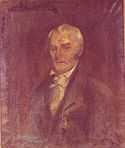Lytle family
The Lytle family of Cincinnati is considered to be Cincinnati's first family and the founders of Cincinnati, Ohio.
Captain William Lytle

Captain William Lytle (1728–97), was deeded 1,200 acres (4.9 km2) of land for service as one of General Washington's elite corps of officers in the Revolutionary War (the Society of the Cincinnati).[1] He solicited settlers to follow him with the promise of land. In April 1780, (8 years before John Cleves Symmes and Colonel Robert Patterson), Capt. Lytle and his family braved the frontier with 63 Kentucky flatboats of settlers accompanied by 1000 fighting men led by Colonel Ludlow. They landed on April 11 and were promptly attacked by an Indian party mounted on horseback. (Centennial History of Cincinnati, p. 120)
Colonel Israel Ludlow (1765–1804) was tasked with setting up a fort on the site to secure the land from Indian tribes and led a party of soldiers down the Ohio River. The soldiers and the settlers combined parties in Pittsburgh and floated down the river on Kentucky flatboats together. The flatboats were disassembled upon arrival and the wood used to build Fort Washington.
Three Lytle relatives were named Surveyor General of the Northwest Territory, based in Cincinnati. Family members included William Lytle II, the Surveyor General of Illinois, Congressman Robert Todd Lytle (a relative of the Todd-Lincoln family), Brig. Gen. William Haines Lytle (the poet), and members of the Livingood family. Captain Lytle (1728–97) gave land to his daughter Anne for a wedding gift on which she and her husband, Judge John Rowan, built the Federal Hill Mansion, in Bardstown, Kentucky, which, according to tradition, inspired the song My Old Kentucky Home.
William Lytle

His son, William Lytle, (- 1831) amassed a fortune surveying the lands of Revolutionary War veterans granted land in Ohio, and was a good friend of Andrew Jackson, serving in his "kitchen cabinet". Considered the first landed millionaire in the West, Lytle lost most of his money during a financial panic when western landowners could not pay their debts and the banks in Cincinnati failed. Using the land from his father's land grant, he founded Cincinnati College and Cincinnati Law College (the University of Cincinnati). He funded it with $500 of his personal money, land donated by his father William Lytle, and $500 he solicited from a group of prominent first citizens of Cincinnati (John H. Piatt, David E. Wade, Ethan Stone, William Corry, John H. Lytle, Gen. James Findlay, Andrew Mack, Jacob Burnet). Each shareholder took turns serving on the Board of the Cincinnati College[2]
The Lytles served in the French and Indian War, the American Revolutionary War, the Mexican–American War, and the Civil War.
William Haines Lytle

Brigadier Gen. William Haines Lytle (1826–1863) was a lawyer, educated man and syndicated poet (in newspapers). His poems spoke of courage, loss, the glory of war and tales of gallantry. He led the Irish troops (the most recent immigrants to the U.S.) and was so admired by his troops that six weeks before his death they presented him with a medal to show their affection. His most famous poem was Antony and Cleopatra was beloved by both North and South in antebellum America and regularly memorized by school children in the U.S. through the 1940s. General William Haines Lytle died leading a charge at Chickamauga in the Civil War. A third of the battlefield is named for him and a pile of cannonballs mark the spot where he fell. When he was shot and fell from his horse with a half-finished poem in his pocket. A southern soldier who served with him in the Mexican–American War, stood guard over his body under arrangements could be made to return his body to the North. Under a flag of truce, both southern and northern soldiers escorted his body to Louisville where it was loaded on paddlewheeler and returned to Cincinnati. Since most soldiers were buried where they fell in the Civil War, few bodies were returned to their families. The city immediately went into mourning with all the windows of the stores draped in black. His horse, Fallaballaugh, another gift from his troops, with his boots turned backwards led a parade down 4th street with a long line of dignitaries.[3]
A branch of this family settled to the north in Butler County, where Judge Robert Lytle acquired a section of land from the U.S. and named it Milford Township. Prominent descendants include Sen. Homer Truett Bone, Secretary of Agriculture Claude R. Wickard, Gov. Andrew L. Harris, James McBride of Hamilton, and others.
Lytle Park, where the Lytle mansion was located, was donated to the city in 1903 by the family, with terms that it remain a park in perpetuity. When an expressway needed to be built downtown, the terms forced the Lytle Tunnel to be built under the park to preserve it. The statue of Abraham Lincoln at the entrance of the park was commissioned by the WPA Works Progress Administration.[4]
References
- ↑ Federal Land Grant signed by Thomas Jefferson, property of Edith Hines
- ↑ The Lytle Papers, Cincinnati Historical Society, Cincinnati, Ohio. and Centennial History of Cincinnati and Representative Citizens, Volume 1 by Charles Theodore Greve
- ↑ Antony & Cleopatra, The Poems of William Haines Lytle, 1865
- ↑ WPA Guide to Cincinnati, 1987, pgs. 162-163